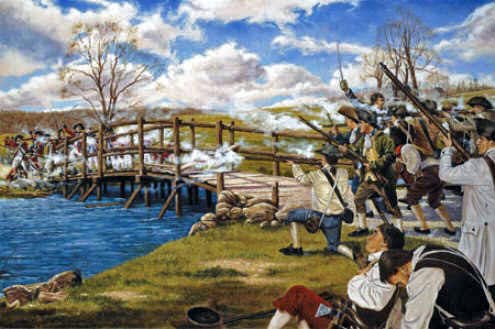
|
20A026 1776, Reconsidered by Jim Davies, 6/30/2020
The American Revolution was unnecessary. As a violent overthrow, that is; it was certainly desirable for Americans to rid themselves of government overlords, but that could and should have been accomplished another way.
So what should the oppressed colonists have done? First, bear in mind that the "loyalists" outnumbered those wanting the Brits out, by about 2 to 1. Had there been a referendum, as in Scotland in 2014 and as in the whole UK about Brexit in 1975 and 2016, the loyalists would have won. They weren't passionate monarchists, but didn't want war. Voting, then, would not have done the job. What else? It's really very easy: all the colonists had to do was to stop working for the Brits - to quit their government jobs. Had that been done, the occupiers would no longer have seen the American Colonies as a revenue-generating asset; they'd have had to send over their own people to administer the fractious colonies, and that would have defeated the whole purpose. Today about 40 million work directly or indirectly for government, about 30% of the workforce. In the 1770s that would have been at least five times smaller, say 6% tops; and the population was 2.5 million, of whom perhaps a million were working. So the Brits would have had to ship over some 60,000 employees, with families - and then do it again after a while if and when the first batch became infected by the revolutionary bug, and also left government service! Too expensive by far. "Easy" in concept, certainly; but not quite that easy to persuade all government workers to forego a comfortable job, especially those with loyalist sentiments. That would have required persuasion, patience, education, time. But not blood. Perhaps it would not have been finished by 1781; but in the grand sweep of time, do five or ten years make all that much difference? We have exactly the same task here and now - to persuade everyone to quit their government jobs, and of course not to accept one. So that means everyone. An outline of the reasoning is ready on the QuitGov site, and the in-depth education that is probably needed to set it all in stone awaits the student in TOLFA. Further, we have a much better argument than the American rebels had: they were calling for one government to be replaced by another, on the false pretext that Americans could set limits on its power. We, in contrast, are going to the root of the matter and showing that all government is hostile to human beings. Suppose then that the colonists had set about educating themselves better, using perhaps Tom Paine's fine textbook on limited government, Common Sense. Suppose that by around 1780 most government workers had quit, so leaving the BritGov at the end of a long limb. I reckon they would have been ready to do business - to grant independence, with perhaps some reciprocal clauses to give the homeland some favorable terms of trade. Would that not have been a process far preferable to the bloodbath that actually took place? Such a process did actually occur, later, elsewhere in the Empire. New Zealand, Australia, India, South Africa, Canada and all the rest of them except a handful of small outposts became independent. None of them followed the idea of depriving the Brits of local workers - though in India, one of the factors that speeded their departure was the practice of peaceful non-cooperation; but in all cases, secession was accomplished peacefully because they were rightly seen as liabilities, not assets. Except for ours, there was never a war between London and a colony; the Boer War was one between British and Dutch settlers in South Africa, with the homeland supporting the former. So Americans could have set an example of peaceful transfer and triggered the process much sooner. A footnote: even if the QuitGov principle had not been followed, even if the rebels had persisted in the use of violence, there was still no need to engage in traditional warfare with a Continental Army facing professional Redcoats in pitched battles and standing to lose, without timely help from French regulars who shared none of their ideals except hostility to Brits. They could so easily have continued the way they began, with guerilla warfare; small groups or militia, harassing the occupiers until they gave up and went home. Time and again, that has proven a successful military strategy. Yet even that far less costly method was discarded in favor of greater bloodshed. It was an ominous beginning.
|
|
||||||||||||||||||||||||||||||||||||||||||

 Some aspects of the violence were arguably defensive. Lexington and Concord come to mind; in 1775 the Redcoat government had set out to confiscate a cache of private property - guns - and the owners shot the gun grabbers to prevent that. Their guns were vital tools of their trade, and of course for self-defense. But generally, the idea of forcing the British away by killing them in systematic warfare has nothing to commend it; no more than it would be justified today to marshal some militia and wage war on Town, State and Federal governments, even though their "usurpations" are far, far worse than those listed in the Declaration of Independence.
Some aspects of the violence were arguably defensive. Lexington and Concord come to mind; in 1775 the Redcoat government had set out to confiscate a cache of private property - guns - and the owners shot the gun grabbers to prevent that. Their guns were vital tools of their trade, and of course for self-defense. But generally, the idea of forcing the British away by killing them in systematic warfare has nothing to commend it; no more than it would be justified today to marshal some militia and wage war on Town, State and Federal governments, even though their "usurpations" are far, far worse than those listed in the Declaration of Independence.








